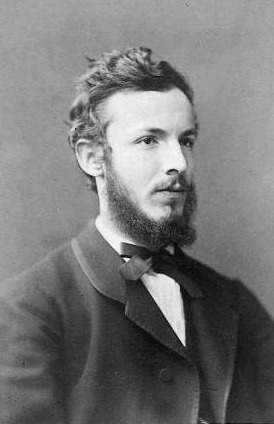|
Georg Cantor
Georg Ferdinand Ludwig Philipp Cantor ( ; ; – 6 January 1918) was a mathematician who played a pivotal role in the creation of set theory, which has become a foundations of mathematics, fundamental theory in mathematics. Cantor established the importance of one-to-one correspondence between the members of two sets, defined infinite set, infinite and well-order, well-ordered sets, and proved that the real numbers are more numerous than the natural numbers. Cantor's method of proof of this theorem implies the existence of an infinity of infinities. He defined the cardinal number, cardinal and ordinal number, ordinal numbers and their arithmetic. Cantor's work is of great philosophical interest, a fact he was well aware of. Originally, Cantor's theory of transfinite numbers was regarded as counter-intuitive – even shocking. This caused it to encounter resistance from mathematical contemporaries such as Leopold Kronecker and Henri Poincaré and later from Hermann Wey ... [...More Info...] [...Related Items...] OR: [Wikipedia] [Google] [Baidu] [Amazon] |
Saint Petersburg
Saint Petersburg, formerly known as Petrograd and later Leningrad, is the List of cities and towns in Russia by population, second-largest city in Russia after Moscow. It is situated on the Neva, River Neva, at the head of the Gulf of Finland on the Baltic Sea. The city had a population of 5,601,911 residents as of 2021, with more than 6.4 million people living in the Saint Petersburg metropolitan area, metropolitan area. Saint Petersburg is the List of European cities by population within city limits, fourth-most populous city in Europe, the List of cities and towns around the Baltic Sea, most populous city on the Baltic Sea, and the world's List of northernmost items#Cities and settlements, northernmost city of more than 1 million residents. As the former capital of the Russian Empire, and a Ports of the Baltic Sea, historically strategic port, it is governed as a Federal cities of Russia, federal city. The city was founded by Tsar Peter the Great on 27 May 1703 on the s ... [...More Info...] [...Related Items...] OR: [Wikipedia] [Google] [Baidu] [Amazon] |
Foundations Of Mathematics
Foundations of mathematics are the mathematical logic, logical and mathematics, mathematical framework that allows the development of mathematics without generating consistency, self-contradictory theories, and to have reliable concepts of theorems, proof (mathematics), proofs, algorithms, etc. in particular. This may also include the philosophy of mathematics, philosophical study of the relation of this framework with reality. The term "foundations of mathematics" was not coined before the end of the 19th century, although foundations were first established by the ancient Greek philosophers under the name of Aristotle's logic and systematically applied in Euclid's Elements, Euclid's ''Elements''. A mathematical assertion is considered as truth (mathematics), truth only if it is a theorem that is proved from true premises by means of a sequence of syllogisms (inference rules), the premises being either already proved theorems or self-evident assertions called axioms or postulat ... [...More Info...] [...Related Items...] OR: [Wikipedia] [Google] [Baidu] [Amazon] |
Leopold Kronecker
Leopold Kronecker (; 7 December 1823 – 29 December 1891) was a German mathematician who worked on number theory, abstract algebra and logic, and criticized Georg Cantor's work on set theory. Heinrich Weber quoted Kronecker as having said, "'" ("God made the integers, all else is the work of man").The English translation is from Gray. In a footnote, Gray attributes the German quote to "Weber 1891/92, 19, quoting from a lecture of Kronecker's of 1886". Weber, Heinrich L. 1891–1892Kronecker 2:5-23. (The quote is on p. 19.) Kronecker was a student and life-long friend of Ernst Kummer. Biography Leopold Kronecker was born ...[...More Info...] [...Related Items...] OR: [Wikipedia] [Google] [Baidu] [Amazon] |
Transfinite Number
In mathematics, transfinite numbers or infinite numbers are numbers that are " infinite" in the sense that they are larger than all finite numbers. These include the transfinite cardinals, which are cardinal numbers used to quantify the size of infinite sets, and the transfinite ordinals, which are ordinal numbers used to provide an ordering of infinite sets. The term ''transfinite'' was coined in 1895 by Georg Cantor, who wished to avoid some of the implications of the word ''infinite'' in connection with these objects, which were, nevertheless, not ''finite''. Few contemporary writers share these qualms; it is now accepted usage to refer to transfinite cardinals and ordinals as ''infinite numbers''. Nevertheless, the term ''transfinite'' also remains in use. Notable work on transfinite numbers was done by Wacław Sierpiński: ''Leçons sur les nombres transfinis'' (1928 book) much expanded into '' Cardinal and Ordinal Numbers'' (1958, 2nd ed. 1965). Definition Any finite natu ... [...More Info...] [...Related Items...] OR: [Wikipedia] [Google] [Baidu] [Amazon] |

